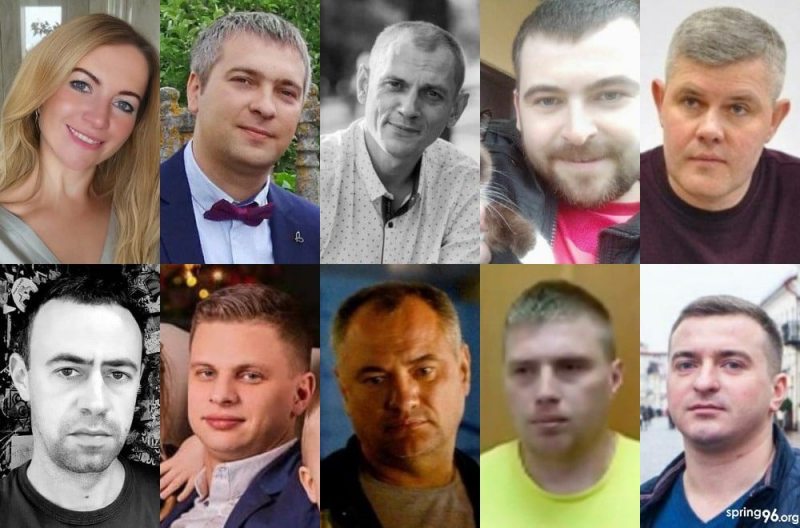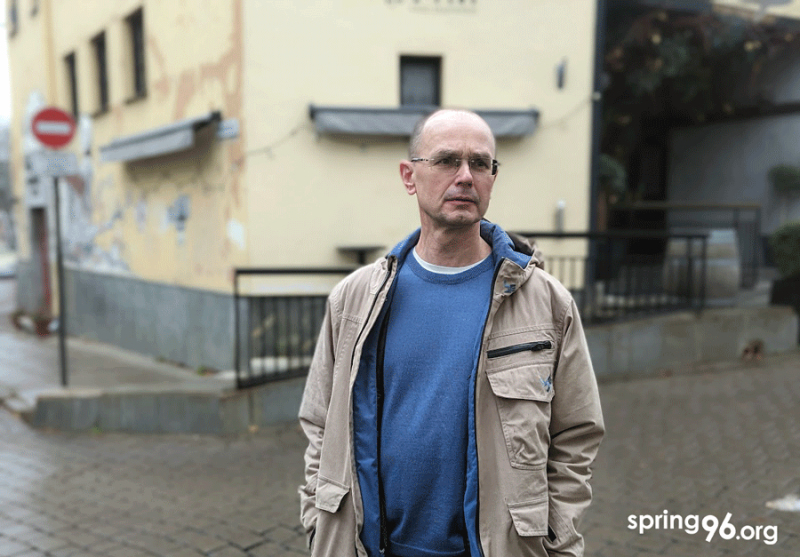Independent trade unions of Belarus destroyed in four years: 17 activists still behind bars
Among the violations of workers' rights in Belarus, the destruction of the independent trade union movement and the criminal prosecution of its participants play a major role. According to Viasna human rights activists, over the period from September 2020 to 2024, more than 50 activists of independent trade unions and organizers of strike committees were detained. Many have been criminally prosecuted for their work to protect labor rights.
The final defeat of independent trade unions began in 2022
The period from April 19 to April 21, 2022, can be considered the beginning of the authorities' planned dismantling of all independent trade unions in Belarus. The leadership and employees of the Belarusian Congress of Democratic Trade Unions (BKDP), leaders and activists of the trade unions SPM (Free Metalworkers' Union), SPB (Free Belarusian Trade Union), REP (Belarusian Trade Union of Radioelectronic Industry Workers), and some other workers' activists were immediately persecuted. More than 20 people were detained in three days.
As of November 13, 17 defenders of workers' rights remain behind bars, recognized as political prisoners by the Belarusian human rights community.
These are currently serving their sentences in the Trade Union case:
-
Aliaksandr Yarashuk, the head of the Belarusian Congress of Democratic Trade Unions;
-
Henadz Fiadynich, a former head of the Trade Union of Radioelectronic Industry Workers (REP);
-
Viachaslau Areshka, a Belarusian political scientist and public figure, activist of the REP trade union;
-
Volha Brytsikava, the leader of the Independent Trade Union of Navapolack Naftan OJSC;
-
Aliaksandr Khanevich, the head of the primary branch of the Belarusian Independent Trade Union at the Grodno Azot enterprise;
-
Artsiom Zharnak, the chairman of the primary trade union organization of the Free Union of Metalworkers at MAZ;
-
Aliaksandr Kandratsiuk, an activist of the Belarusian Free Trade Union (SPB).

In the Workers' Movement case, during a special operation of the security forces in the period from September 18 to 26, 2021, more than 15 activists were detained in different cities of Belarus, who defended workers' rights at their enterprises, tried to activate the strike movement, organized strike committees, and advocated sanctions. On October 18, the Workers' Movement was the first in Belarus to be recognized as an "extremist" formation. Ten of its representatives, who were sentenced to 11–15 years in prison, are still behind bars and recognized as political prisoners:
-
Hanna Ablab, an employee of the Belarusian Railway;
-
Aliaksandr Hashnikau, an employee of the Belarusian Metallurgical Plant;
-
Siarhei Dziuba, an employee of the Belarusian Railway;
-
Uladzimir Zhurauka, an operator of the Ammonia-3 workshop at Grodno Azot;
-
Aliaksandr Kapshul, a former legal adviser of JSC Naftan of the Polymir plant;
-
Ihar Mints, a former legal adviser of JSC Naftan of the Polymir plant;
-
Andrei Paheryla, a former repairman of the Ammonia-3 workshop at Grodno Azot;
-
Valiantsin Tseranevich, an assistant foreman at the Chemical Fiber plant of Grodno Azot;
-
Siarhei Shametska, an employee of Atlant CJSC;
-
Siarhei Shelest, a former equipment operator of the Ammonia-3 workshop at Grodno Azot.
Former political prisoners Siarhei Antusevich, Iryna But-Husaim, Zinaida Mikhniuk, Aliaksandr Mishuk, and Vasil Berasneu, who was released on pardon, have fully served their sentences.
Activists Mikhail Hromau, Aliaksandr Mialeshka, Halina Smirnova, and Sviatlana Sakovich were released from home confinement.
Aliaksandr Kukharenka, an employee of the Belarusian Independent Trade Union at Naftan, was held in a pre-trial detention centre and under house arrest, but the charge was eventually dropped.
Uladzimir Berdnikovich was recognized as a former political prisoner retroactively.
Aleh Matskevich: "This is not the only claim that international organizations have against our country"
On July 18, 2022, the Supreme Court decided to dissolve the Belarusian Congress of Democratic Trade Unions (BKDP), and a few days earlier four of its member organizations — the Belarusian Independent Trade Union (BNP), the Trade Union of Radioelectronic Industry Workers (REP), the Free Trade Union of Belarus (SPB), and the Free Trade Union of Metalworkers (SPM). The court recognized trade unions as extremist organizations. On October 18, 2021, the Workers' Movement was recognized as the first extremist formation in Belarus.
The International Labour Organization (ILO) and the IndustriALL association of global trade unions did not recognize the dissolution of BKDP and its structures by the Belarusian authorities and to this day perceive them as full member organizations.
Reflecting on the role of trade unions in the country's life and the protection of workers' rights, lawyer Aleh Matskevich returns to the events of the modern history of Belarus and draws certain conclusions from them.

- Lawyer Aleh Matskevich
"From the very beginning of his reign, Aliaksandr Lukashenka has always emphasized his importance as a guarantor of the welfare of the Belarusian people, the correctness of the existing social and economic development model, and the high level of state support for people. The entire ideological vertical is aimed at approving this policy. The right of one person to define and solve the problems of workers is not disputed by those who, by their nature, must pursue an independent policy aimed at protecting workers — trade unions. After 2022, the workers themselves are completely deprived of the right to join independent professional associations and are forced to participate exclusively in the work of state-owned trade unions," the lawyer emphasizes.
Matskevich believes that in Belarus, the social partnership is fundamentally different from the civilized model and is based on the trilateral relationship "state–employers–employees". Instead of an equal and complementary dialogue between them, they merged and consolidated interests under the leadership of the state. The latter, instead of acting as an arbitrator between employers and workers, subordinated them to its interests and deprived them of independence. The ideological justification for these processes is social and economic stability, guaranteed employment, and well-being.
"No 'win–win' approach can be expected with such a strategy. Only the state stands to gain, while trade unions and workers are in a losing position. It is easy to find examples: imagine a strike by Belarusian teachers or steel workers demanding higher salaries. The existing stability model simply does not provide for such an option. Meanwhile, in the West, where people's well-being is higher, employment rates are steady, and problems are solved more flexibly, social and economic indicators have levels unattainable for us. The depth of the fall is also reflected by the fact that in the entire history of the International Labour Organization and the operation of Convention No. 87 On Freedom of Association and Protection of the Right to Organise Convention (entered into force for Belarus in 1956), Belarus is the first and only state so far to be sanctioned for violating the right to freedom of trade unions under Article 33 of the ILO Constitution. And this is not the only claim that international organizations have against our country as a whole," Matskevich sums up.

















